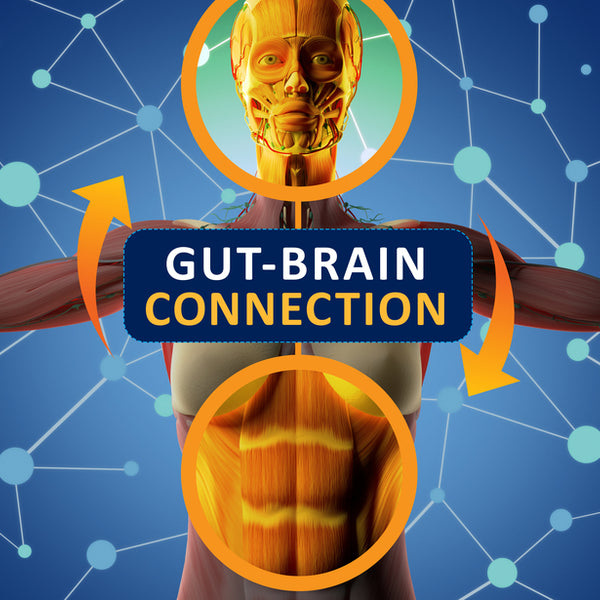
Syntol Supports Digestive Function and a Positive Mood
Syntol Enhanced Probiotic
Syntol is a nutritional supplement that supports digestive function as well as mental health through a combination of probiotics and prebiotics. Probiotics or healthy bacteria are well-known for their ability to enhance digestive health, but probiotics also promote optimal mental performance [1]. This is due to the sophisticated connection between the gut and the brain. More specifically, the digestive tract plays a primary role in the transfer of vital nutrients to the brain and the intestinal environment also contains nerves along with beneficial bacteria that support proper cognitive function [2-4]. In order to maintain sufficient nutrient transport to the brain’s cells, the digestive tract must remain healthy.
Unfortunately, inflamed nerves or low levels of healthy bacteria (probiotics) can allow harmful invaders to damage the intestinal lining, disrupt the absorption of nutrients, and hinder the transfer of nerve signals that regulate cognition [2, 4]. Interestingly, research shows that probiotics influence nervous system activity by supporting the protective layer of the intestinal lining [5]. More importantly, they help prevent harmful substances (e.g., toxins, bacteria) from passing through damaged tissue lining where they can enter the bloodstream and cause various types of illnesses [5]. However, probiotics also target inflammatory substances that can negatively affect nerves that line the gut. In doing so, probiotics support signal transfer from nerves in the gut that regulate mental performance and even neurotransmitter (brain chemical) activity.

Serotonin & The Microbiome
One neurotransmitter that plays a major role in digestive function and mental health is serotonin [5-7]. Indeed, serotonin helps regulate stress responses, emotion control, appetite, and sleep. It also supports key functions in the gut such as intestinal secretions (e.g., stomach acid production) and gastrointestinal motility. In addition, research shows that low levels of this vital brain chemical are associated with depression and altered digestive function [5, 6]. Fortunately, in addition to protecting the lining of the intestines, probiotics also support optimal serotonin levels. How so?
The body uses an essential amino acid called tryptophan to produce serotonin, but reduced probiotic activity in the gut is linked to decreased tryptophan production [7]. Accordingly, probiotic supplementation increases tryptophan levels, which in turn heightens serotonin production [5, 7]. The subsequent increase in serotonin helps target depressive symptoms, while improving mood, emotion regulation, and stress response [7]. Therefore, these healthy bacteria promote a better mood by enhancing the levels of a brain chemical (serotonin) that is linked to reduced anxiety, stress, and depression [8, 9].
Syntol was specifically formulated with eight different types of probiotics that support a healthy intestinal environment, targeting both brain function and digestive activity. This scientifically-supported supplement also contains a prebiotic fiber that nourishes good bacteria (probiotics) and promotes their growth [10]. Digestive enzymes have been added to the formula as well. The carefully chosen digestive enzymes ensure that food is thoroughly digested. Digestive enzymes work in conjunction with probiotics to ensure that nutrients are properly absorbed and transported throughout the body, including the brain. This is turn enhances mental health, digestion, and overall quality of life.
Overall, Syntol provides the body with probiotics that have the ability to support digestion along with cognitive performance by disrupting the overgrowth of harmful invaders and protecting the intestinal lining [8].
References
- Gareau MG, Sherman PM, Walker WA. Probiotics and the gut microbiota in intestinal health and disease. Nat Rev Gastroenterol Hepatol. 2010, 7(9):503-514.
- Molloy CA, Manning-Courtney P: Prevalence of chronic gastrointestinal symptoms in children with autism and autistic spectrum disorders. Autism. 2003;7(2):165-171.
- Ming X, Chen N, et al. A Gut Feeling: A Hypothesis of the Role of the Microbiome in Attention-Deficit/Hyperactivity Disorders. Child Neurol Open. 2018;5:2329048X18786799.
- Verlaet AA, Noriega DB, Hermans N, Savelkoul HF. Nutrition, immunological mechanisms and dietary immunomodulation in ADHD. Eur Child Adolesc Psychiatry. 2014;23(7):519-29.
- Wallace CJ, Milev R. The effects of probiotics on depressive symptoms in humans: A systematic review. Ann Gen Psychiatry. 2017; 16: 14.
- Owens MJ, Nemeroff CB. Role of serotonin in the pathophysiology of depression: focus on the serotonin transporter. Clin Chem. 1994;40(2):288-95.
- Desbonnet L, Garrett L, Clarke G, Bienenstock J, Dinan TG. The probiotic Bifidobacteria infantis: An assessment of potential antidepressant properties in the rat. J Psychiatr Res. 2008;43(2):164-74.
- Kechagia M, Basoulis D, et al. Health benefits of probiotics: a review. ISRN Nutr. 2013, 2013:481651.
- Kligler B, Cohrssen A. Probiotics. Am Fam Physician. 2008, 78(9):1073-1078.
- Roberfroid M, Gibson GR, Hoyles L, et al. Prebiotic effects: metabolic and health benefits. Br J Nutr. 2010, 104(Suppl 2):S1-S63.